#the one thing sonic hates is oppression sonic is all for freedom and living your life to the fullest and being yourself etc etc
Text
just saw some weird homophobic hardcore christian person saying that sonic and shadow are too gay in sonic prime and thats bad because being gay is bad and on one hand i do not want any ships becoming canon like in general and i think a lot of sonadow fans are being super annoying about sonic prime and exaggerating how gay they are but also. it would be kind of hilarious if sonic and shadow kissed in the last episode just to make people who think like that mad
#its wild how many sonic fans are super bigoted when the sonic franchise is the way that it is#the one thing sonic hates is oppression sonic is all for freedom and living your life to the fullest and being yourself etc etc#i dont wanna go into too much detail because i really dont wanna start drama or be responsible for anybody being harassed#no matter how annoying or shitty they are. but#i looked at some of their other takes out of curiosity and its wild. they think shadow existing is promoting a satanic agenda or whatever#and half their reasoning for this makes them look like that picture of the guy in front of the board with all the paper and red strings#like bro what are you talking aboutttt
27 notes
·
View notes
Text
My opinion on IDW being canon to Sonic
I watched a video by GamesCage on the topic, who I've been watching a long while on YT before subscribing to him recently on Twitch, and it reminded me of my own thoughts on the matter as well!
But first some preemptive notes because I am entering Sonic discoursespace:
This is just some guy's opinion about a little blue dude! That's it! If you hate it or me personally because of it, I refer you to this image:
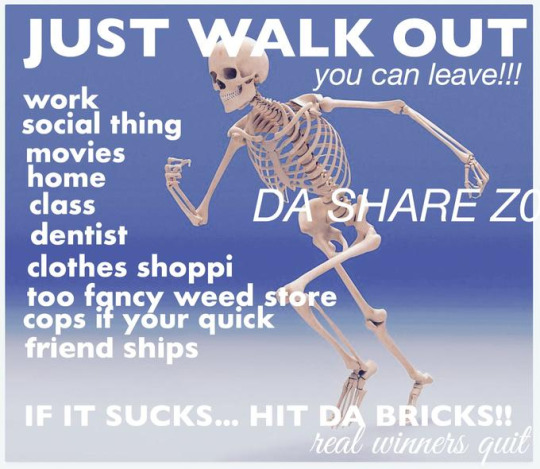
I won't ever go into using insulting or uncivil language. But because this is an opinion essay and I got opinions up the wazoo, I'm also not trying to word things in some neutral, disinterested way to appeal to all audiences here
That being said, game-story-wise, we don't fuck with meta-era shit here. I Do Not See It
I'm all for chats and discussions about the topic, agreement or disagreement alike in response to this essay—things just ought to stay civil and respectful. Think of WWSD (What Would Sonic Do?) and the image above
Sonic's morality and what IDW misunderstands of it
Though I respect what the IDW team does (I fondly remember following Evan Stanley's Ghosts of the Future on Deviantart back in the day), I don't prefer their characterisation of Sonic, and that alone is enough to have me a little chagrined as to IDW's integration into the games' canon. I think it's because, ultimately, it detracts from what makes Sonic's character—specifically his morality—unique and appealing to me. Though he isn't nearly as anti-hero in nature as characters like Shadow, Sonic still has moral tendencies that are atypical for characters that occupy the hero role as he's been avowed to have in the games, e.g. being labelled Team Hero with Tails and Knuckles multiple times
To give some sense of signposting, here are the headings of this essay:
Sonic distinctive moral thinking
- The games' simple, reactive Sonic
- IDW's merciful, principles-first Sonic: on freedom and oppression
- Sonic's self-centred in a way, though, right?
The mascot problem
- "What's your idea then, genius?" – the reader reading this
- Why keep things static
- Examples of peak Sonic
Conclusion
Sonic's distinctive moral thinking
To contextualise my judgement of Sonic as distinctive in his moral thinking, I think there is a tendency in Western media to give heroic characters very merciful streaks. Think Superman or Batman—codes of never killing or always offering mercy, often with backstory or informed moral reasoning behind it. While these streaks are understandable, they appear often and thus don't ring as special or particularly unique to me. Sonic has always been interesting to me because he explicitly does not entertain such clear moral principles. His attitudes embodied in his SA2 theme "It Doesn't Matter," Sonic Unleashed, or the Storybook Series (Black Knight being my favourite), show that he just does what he thinks is right and shows no qualms using considerable force (lethal in the case of Black Knight) if he has to against those he thinks are doing wrong—even against people who he would be friends with, like Merlina. He does not barter or reason; he takes action, moves before he thinks, and follows his heart
The games' simple, reactive Sonic
From my interpretation of Sonic regarding mercy, examples from the games show how he isn't interested in rehabilitating or looking for threats to neutralise like some Miguel O'Hedgehog. These tendencies become most apparent when his friends are involved. A standout example is when Amy protects E-102 Gamma from Sonic, convincing Sonic that he isn't like the other badniks. Another, more indirect example is Gemerl, where Sonic fights and subdues him from causing more harm but Tails is the one who reprograms and rehabilitates Gemerl, who lives happily with Cream and Vanilla with his more peaceful disposition. Sonic doesn't go out of his way to help Gemerl post-defeat, but he doesn't doubt or attack him further after his integration either
At heart, I find Sonic to be a reactive, not proactive, hero. He won't go out of his way to check if the day needs saving—he's not a dutiful guardian doing patrol like Knuckles or a principled fighter for an organisation like Shadow—but if Sonic sees someone in need, he won't just pass them by. And I find Sonic's moral judgements to be simple, instinctual, and self-centred in the most literal sense. They come from his bias towards his friends' judgement and what he believes to be right, regardless of how others may judge his actions. I've only mentioned some examples, but they highlight to me that Sonic is neither healer nor hunter. His main priority isn't rehabilitating or reasoning with his foes—he will do what he feels he needs to do, even if that means destroying something or someone for good. But, as Amy for E-102 and Tails and Cream for Gemerl show, he won't go out of his way to make sure threats are dealt with through violence if his friends vouch for them.
IDW's merciful, principles-first Sonic: on freedom and oppression
In IDW, the topic of him showing so much mercy and espousing freedom as an ideal he thinks everyone, even his enemies, deserves makes him much more merciful and deliberate in his mercy than I like him to be. I want to discuss this by briefly expanding on oppression and freedom, a topic that comes up in Surge and Sonic's fight and Surge angrily questions why Sonic wouldn't just end her. Sonic essentially answers it's because he values freedom for all, including his enemies', because he can exercise his freedom to stop them. It's representative of why I think some fans take issue with Sonic's characterisation because it warps how much Sonic might believably value freedom versus oppression on two flops: on philosophical concepts and characterisation.
IDW's concept flop, to me, shows a fundamental misunderstanding on the nature of oppression and freedom, assuming some inherent ranking of freedom above oppression. The two are different things: freedom is a kind of instrument, a means of doing things, a concept that has no content in and of itself. In other words, you have the freedom to do X; having freedom is only meaningful insofar as it enables to do what you want. Oppression, however, is not an instrument in the same way; it makes far less sense to say 'you have the oppression to do X' or 'you are oppressed to do X' like you could for 'freedom' and 'free'. Freedom, precisely because it is an instrument, enables far more flexibility—both good, evil, and neutral acts can arise from it. Oppression is a state of being with an inherently negative core, predicated on suffering and the oppressed being harmed.
Quick and messy take from me on this: freedom for all and oppression for some is worse(!) than freedom for some and oppression for none. But here's something that has a source, leading to the characterisation flop: according to Sonic Adventure's DX Director's Cut manual, the only thing Sonic hates is oppression (for, presumably, anyone). Honestly, you don't even need a game manual to tell you that. I think IDW writers make the mistake of assuming the inverse to be true of Sonic as well: that the thing he loves most is freedom (for, presumably, anyone).
Oppression being the only thing Sonic hates does not mean freedom is the only thing Sonic loves.
It may be notoriously slippery to insist on consistency in the Sonic franchise (or maybe franchises, plural), but this philosophical gloss on freedom and oppression starts to explain why IDW's characterisation strikes me as inherently contradictory to Sonic's preexisting values. Namely, it shows how IDW commits a false equivalence between the two and assigns it to Sonic. Sure, Sonic likes freedom, but that's different to showing mercy and second chances. IDW ends up conflating the two. As a result, IDW has Sonic care more about the principle of freedom than about the feelings and suffering he knows he or his loved ones have gone through. Put another way, it makes little to no sense why Sonic would prioritise freedom for all, even his enemies, when he has been shown to much more consistently put the most weight on what his friends feel and what he himself thinks. IDW does little to no detectable work establishing why Sonic would have such priorities either
Also, not a real argument—just taking things to the extreme in a throwaway thought—but could you imagine Sonic in the beginning of Unleashed actually considering Eggman's pleas saying he's changed and telling Eggman he...values his freedom? Like. c'mon
Sonic's self-centred in a way, though, right?
How about that self-centred angle, though? Sonic's way of thinking is highly independent—he will do what he thinks is right, first and foremost. It would be easy to claim that IDW's characterisation is just a mindset Sonic just holds in the comics, and that alone passes muster; his brand of ethical egoism admittedly does a lot as writerly cover to justify nigh anything about him. Looks like a hedgehog, smells like a hedgehog; chances are it's our hedgehog, right?
I disagree. One: if IDW is considered canon and yet is just so different to what's appealing about Sonic in the games, then the decision to make IDW Sonic canon, to be frank, kinda sucks. That ain't my Sonic—that's some Marvelised-DC version of him trying to moralise that I don't find compelling, distinctive, or endearing.
Two: even if you try to adopt the angle that upholding freedom for all would just be what Sonic believes to be right, it would still be the same as saying Sonic cares more about philosophical ideals than what he sees right in front of him. He's famously poked fun at Knuckles for being gullible before—why is Sonic himself showing that same gullibility and benefit of the doubt towards hostile enemies or those who have notably wrought so much damage to the lives of those he loves?
The trouble is that IDW builds no meaningful narrative foundations on top of which to stake this claim on Sonic's mindset when the games exist. Like, I don't even privilege the games just because they've been around first and for longer (even though, hey, that is true)—he's just cooler in them. Sonic is no philosopher; he's repeatedly shown it's genuinely not that deep when it comes to his moral thinking in the games. All it is is that he has a good heart. As a result, it comes off as a considerable mischaracterisation to show his enemies mercy mostly in the name of freedom or hope for their change (i.e. lofty ideals) compared to something actionable he can do (i.e. kick their ass and break their tech so they don't hurt anyone he cares about again).
The mascot problem
GamesCage mentions a worthwhile point which he calls the mascot problem. Sonic, as a mascot for Sega, has certain narrative lines he cannot cross or change for good. Like with Mario, there is a clear status quo to maintain; for one, Eggman cannot ever truly be vanquished. However, unlike Mario (with the one exception of Super Mario Galaxy), Sonic routinely has narratives that he and his friends undergo. There has to be this delicate balance that Sonic Team, IDW, and anyone writing for Sonic must contend with as a result. You have to write stories—events and plot where characters grow and change and are affected—but maintain the status quo where many fundamental things cannot change
In other words: how do you explain that Sonic never gets rid of Eggman or his other enemies because he, as a company mascot, cannot ever do so?
IDW does this one way by assigning Sonic an inadvertent little philosopher's cap, which I've already opined is a mischaracterisation. It also just generates another kind of untenable narrative problem that's even harder to reconcile: how do you justify that Sonic, hero with a heart of gold, just lets his enemies keep on going for freedom's sake? Arguably, all that does is dress up the mascot problem but with worse consequences—it makes Sonic less likable. It casts him as someone who essentially ends up condoning his enemies' actions, which has already led readers to question his judgement and whether they would even want to root for a character like that when you have an alternative and contradicting blueprint that the games have already provided for him. Like, my boy embodies direct action and IDW turns it into direct-ish-but-hey-do-what-you-want-who-am-I-to-judge action. Dress it up however you want; it's a nerf on who he is
"What's your idea then, genius?" – the reader reading this
In my eyes, what could work for the mascot problem is falling back on the static nature of the characters that have already been long established. The basic formula is there: Eggman is tricksy, proactive, and two steps ahead, but Sonic is always good-hearted enough, reactive enough, and fast enough to catch up by the end.
Elaborating on that formula, you have enough of Sonic's existing characteristics to justify why bad things keep happening despite his presence. He's not like Iron Man, who takes it upon himself to leverage his resources and power to look out for the world when no one's really asked him to. Again, Sonic is a reactive hero; he's not a ruthless hunter and he likes his peace and quiet as well as his adventure. He'll do what he can to fight what's right in front of him but may miss the bigger picture or potential traps by going in too fast. That happened in the beginning of Sonic Unleashed and it made sense. Even in Black Knight, you had him try to whale on King Arthur armed with just a decreasing number of chilli dogs. In an extended or episodic storytelling format, this allows other characters to shine—Tails's powers of analysis, Amy's ability to connect with others emotionally, Knuckles' sense of duty—by contributing to plans and helping Sonic because he has persistent, character-defining flaws. Highlighting his non-proactive and chill nature allows for arcs with more breathing room, too, where the characters aren't going up against some world-ending force or they all hang out. On that front, I'd say IDW has done well giving other characters that spotlight
Briefly touching upon Eggman's characterisation and how that might address the mascot problem, his tried-and-true tendencies should be relied upon, too. He is incredibly intelligent but also a massive narcissist—it makes sense that he has his own sense of short-sightedness where he prioritises and secures his own well-being above all else and underestimates the importance or wrath of godly and natural entities he frequently exploits and disrespects. Because of how strong and distinctive Eggman's brand of narcissism and villainy is, it is honestly fitting that he will never change; that alone explains how often he will cause trouble and will never fully succeed. And that also justifies why Sonic will always be the one to fight him. Both have their imperfections and flaws and that has them in a deadlock.
Why keep things static?
Now, this might bring up the question of static-ness. It might seem like an odd solution to mascot problem to just lean into it. Surely, there has to be greater justification or some potential for change for things to stay interesting, appealing, and compelling for Sonic and his stories.
In response, here's my hot take: ya don't need any of that.
Here's a longer version of my hot take: in any given narrative, Sonic is at his best when he does not grow or change. Sonic is already peak. Others may flounder and oscillate, but he remains steadfast with his heart of gold. He is a pillar of strength. He is static. Think of him in the Sonic Adventure games, characters and humans' reactions to him in Sonic X, the knights of the round table's reactions to him in Black Knight, Chip himself remarking that Sonic has such a good heart that not even the powers of a fucking dark primordial god infecting and transforming him can change who he is on the inside in Unleashed. When unstoppable forces come about, lo and behold, he is the immovable object they meet!
Sonic always stays on the move—that's how you can justify all the amazing, different, wild stories he'll go through, because he is an adventurer at heart. You don't need to humanise a character and subject them to point-A-to-point-B arcs to make them enduring, beloved characters. Just because that's a common format for characters and stories and comics to take nowadays doesn't mean that it's a good fit for Sonic. He's never been one to do something just because everyone else is doing it anyway. I, no joke, think Sonic should be treated like a mythical folklore figure, never-changing and transforming the lives of those he meets before breezing on by—and what figures are more enduring in our consciousness than those of mythology?
And, to refer to IDW, there isn't any need to wax philosophical on top of that. Like I've repeatedly said so far, Sonic is no philosopher (and saying this as someone who did philosophy for undergrad, thank fuck for that). Leave the philosophising and podcast soundbites and video essays to the fans—in fact, I'd even wager the simplicity of Sonic's premise and character, or, hell, even the dissatisfaction that can come from that, is why his fandom even thrives (but that's definitely a separate topic).
Examples of peak Sonic
I forget which interview this was, but Sonic's characterisation was inspired off of Bill Clinton (aged like milk I know; this was before his scandal with Lewinsky), from the idea that actions speak louder than words for him. Obviously, Sonic does get in his quips with his friends and enemies alike, but he's not supposed to be Marvel superhero about it and isn't actually a massive braggart. Even the first episode of Sonic X shows his confidence and demeanour so well—he doesn't need to moralise or talk your ear off for you to know he'll fuck you up. And that's just so much cooler than what IDW accomplishes with their version of Sonic
Like, consider my beloved Murder of StH, which the IDW team had a considerable hand in! Sonic—while recognising that the train is more advanced than other badniks, exhibiting personhood and consciousness—still has the sole objective of destroying the train. Everyone shines and, granted, the format has it so that Sonic doesn't really appear till the end, but he's characterised pitch-perfectly there, instilling so much hope and forward momentum not only in his gameplay but in the heart of the player. Honestly, his late contribution arguably echoes Sonic X, where he often disappears or does his own thing, too
Even in a game or storytelling format where he should be front and centre, you could even explore some big themes with Sonic precisely because of his mental and emotional fortitude! The Storybook Series are so stellar in this regard—you got Sonic helping out Shahra, domestic abuse victim, on dealing with sadness, and him helping Merlina with existentialism and death of all the fucking things. And he doesn't flap his lips about it; he shows it through his actions. He's the protagonist but not in a traditional sense—he's the support and passing through and being unfathomably fuckin cool about it. Any lessons he ends up teaching you is not because he's out to teach you—it's because he's just living his own way and, wouldn't you know it, you just happened to be around for the ride
Conclusion
I'm not excited about IDW Sonic being considered canon because he comes off as an overeager philosopher's take on him when game Sonic is fuckin goated with the sauce. Though the story ideas and arcs in IDW seem cool, Sonic is the heart of the series, and if he's off, then the whole thing ends up a little wonky for my tastes.
To be clear, I don't have issues with different iterations of Sonic as some blanket rule—if the writers do the work to establish why and in what ways Sonic in a particular story is different, then that's just plain fun. Movie Sonic, Sonic Prime, and Sonic Boom are all examples of that. But, above all, the kind of Sonic I adore (and there are in fact many kinds) is the one who you meet and your life is irrevocably changed for the better as he hangs out for a while but never for long. In pivotal moments in the comics, IDW Sonic misses the mark on that for me
Though Sonic Team are making clear moves to integrate all the iterations of Sonic as canon regardless. I do wonder if that, as a move in itself, is the meta-narrative equivalent of Sonic Team changing game-mechanic tacks every game after '06 and Unleashed—a well-intentioned but misguided way to try to appease everyone which I've always thought is the most anti-Sonic thing you can do, but that's just the mascot problem in corporate as opposed to story form.
I was fine with Sonic Twitter just saying 'Everything is canon' as a non-starter – I'll just see how they do what they're intending to do and if I don't like it, then I always got an AO3 account handy
98 notes
·
View notes
Note
Eggman is pretty much fascism and unchecked capitalism in human form. He is a repersantion of it they way Sonic is the representation of freedom.
In the games we get to see glimpses of the world under Eggy's rule and it is not pretty. Even in the first game, Eggman's scrap brain zone is a polluted dystopian hellhole, smog and poison everywhere. Meanwhile green hill zone is a lush paradise full of greenery.
In Sonic CD, we can see even his own robots suffer in the bad futures. They looks broken , neglected and musty. He doesn't even care about his bots. So much for a robot kingdom 🤖👑
Don't get me started on Forces where he fully takes over the earth and turns it into a bleak, broken hellhole and spews propaganda everywhere. Everyone is miserable. He even made a propaganda vid where he encourages people to accept his robotomy treatment and become his robot slaves to make life bearable.(Robots don't need food , water or clean air to breathe. They don't even think)
Benevolent dictatorship it is not. I don't know where people get that from.
Exactly, for it being such a prominent theme in the series, I wish more people would get the message and not dismiss it/miss the point and try to say "Eggman is good, actually". It's much more interesting to look at it for what it is, it's what makes Sonic vs Eggman and Eggman's goals compelling to me to analyze. Eggman is a great representation of the terrible and harmful things humanity can be capable of but without completely blaming the entire human race.
He portrays the dangers of fascism, damage of the environment, and the dangerous destructive lengths one can go to in greed for power and control. There's been many examples of him attempting to captilize on harmful things, carelessly tearing the planet/other planets apart in selfish endeavors, and how dystopian the world would be if he succeeded in enforcing his order. They've explored propaganda, manipulation, war, and invasion with him.
Ignoring the message of Eggman's character also downplays, softens the impact of, and dismisses the meaning of Sonic's character. He's all about freedom and the only thing he hates is oppression, Eggman is the oppressor of the story and Sonic wants to stop him, that way people can live in peace and freedom without Eggman stripping that away from them and forcing them to be and do exactly and only what he wants in the world he wants it to be alone.
It's cool because Eggman is also like an example of if you take your own personal freedom and desires too far with greed and a lust for power and control. To the point that you value it and yourself so much above all else, you want to force everyone else to comply by your rules and fulfill your desires, no matter how much they don't want it and it damages them and the world around you. Meanwhile, Sonic's just happens to benefit the world and people around him.
And in a world where Sonic wins, it stays beautiful, bright, lively and free with nature, wildlife, man, and technology coexisting in harmony and peace. In a world where Eggman wins you get the opposite where it's ugly, dark, dead, and controlled with nature and wildlife suffocated until it's dead- replaced by technology and reshaped in Eggman's selfish image and twisted idea of what a "perfect" world is, one where only he decides what it's like.
It shows through their characteristics, actions and outlook, and their impact on the world and people around them and that's so fucking neat. I don't know why people act like that stopped being a theme when, as long as it's Sonic vs Eggman, it's definitely always present. But I feel that a part of it is absolutely the way that people try to make it seem like Eggman isn't so bad and suggest the idea that maybe he's actually really progressive and wants to do good.
It's very clear that he doesn't lol. Such is obvious by the lengths he's willing to go to get what he wants, knowingly and carelessly hurting many people and even finding sadistic enjoyment in it at other times, all the while acknowledging that he's evil and saying it himself and owning it. He knows he has to create propaganda, lie, and manipulate others into getting what he wants and further his plans which also proves full awareness that what he's doing isn't innocent.
And of course the most obvious is how the world under his control is most often depicted as a dark industrial dead and polluted dystopian hellhole where all suffer, even his own creations, and he doesn't care because he's in control and gets to rule over it and turn it into everything he wants. And their suffering is just part of the idea, which he makes clear with his own words with Eggmanland in Unleashed and the Interstellar Park in Colors, in that he wants people to suffer.
There are times this isn't shown visually in a places of his creation and under his control, such as the Interstellar Park and Ego City. But guess what? There's still tons of danger and death due to attractions in the Interstellar park that he acknowledged and intended as features, and the PAs in Ego City with the propaganda and lies about the intention and "benefits" of animals in robots and the hint that he doesn't actually take criticism- all prove his real sinister intent in it.
It shows that Eggman can also pretty things up and sugarcoat them with visually beautiful creations, sweet words and promises of great things through lies and propaganda. That's scary because it can lure people in, only for them to be subjected to great horrors once they arrive, even if nobody and maybe not even themselves can see and realize it's all a lie and the cost that is their suffering at first, until it's too late and they face it in the most terrible and painful of ways.
And the truth would show visually eventually anyway, evident in Eggmanland's darker polluted setting. Even to the point of further destruction and decay, like CD bad future where even his own creations are broken down and abandoned. He'll destroy the world to build his new one yet even that will rot due to his carelessness as long as it doesn't get in the way of his own enjoyment, he'll use things up and abandon them when they no longer serve him.
In Forces he wants to burn the world so it will be "nothing but ashes, from which a glorious Eggman Empire will rise," willing to cause great damage to get it. That's why he happily blew up Sunset Heights, let Green Hill be dehydrated and die, had forests carpet bombed, and was willing to drop the sun on people. Hell, in the Join the Eggman Empire propaganda video, he promotes further ruination and pollution of the world after he's taken over as a good appealing thing.
And the real reason why is because it will push anyone that's still unwilling after all his attempted lies and propaganda to give in and accept the robotomy treatment, so they don't have to suffer in it anymore because they won't have a choice because it'll be that or die. But with it they'll also have to give up all their freedom and never be able to eat, sleep, or think ever again and Eggman will tell them "that's what we call "living the good life!"
And again, him saying that loving it is mandatory in the video proves he doesn't care how much it hurts people and how much they'll really hate it. He knows full well but doesn't care because it's not about what they want, it's all about him and what he wants and they have no choice or say, they literally have to comply or die. And fuuuck it's so good and messed up. That perfectly represents how terrible and dangerous and harmful his dictatorship is.
Besides the whole "what if he actually cared and genuinely wanted to help people and the world though" which this all clearly disproves, I also see people say they'd like to become robots so they don't think it's so bad. And it's like well fascist dictatorship doesn't suddenly become a good thing just because some of it personally aligns with your desires lol. Authoritarianism doesn't suddenly become good just because it's enforcing your personal morals and values.
I highly doubt anyone would still be saying this if they it really happened and they realized how much they'd sacrifice in it and what they'd have to go through as Eggman clearly doesn't treat his creations well, whether it's through abusing them or just leaving them to decay like those seen in CD bad future. And let's say even if was good for you personally in some way, it wouldn't be for everyone and most people would still suffer because they don't want it.
And let's say your biggest dream came true through it. It's still being enforced through Eggman's fascism and oppression and many will suffer from it and have to abide by it against their will. It's like how Eggman tried to bribe Sonic in the great Super Sonic and Super Eggman Sonic Channel story by saying he could give him a world of chili dogs, no paradise is one that is forced, no matter how pretty and appealing one tries to make it seem.
And in Eggman's case it's not just that but the fact his "paradise" is everyone else's hell, his enjoyment is everyone else's pain, his desires are the antithesis of freedom. Because he's deeply selfish and intends and revels in much of the damage and suffering he causes. It's inherently sinister, harmful, and only his twisted definition of a perfect paradise that serves only himself with his selfishness and self-centeredness that he can't and doesn't care to see past.
He's one fucked up bastard and that makes him so interesting and threatening, he's the main villain of the series for a reason. 💜 It's really interesting to think about the themes he represents and the many different ways they've been portrayed and explored throughout the series and the message it sends just as much as Sonic's, I wish to see more acknowledgement and discussion of it so I try my best to bring light to it with my own contributions like this!
#I looove analysis like this I looove the themes. man#dr eggman#eggman#dr robotnik#dr. eggman#asks#analysis#my post
29 notes
·
View notes
Text
ABOUT
Long as the voice inside me says go, I will always keep on running.
My Sonic is primarily games & IDW comics verse. But with some small divergents here and there.
Basics:
Name: Sonic the Hedgehog
Age: Canonically 15, but my Sonic is defaulted to 19/20. ( varying greater depending on the verse )
Height: 3ft 2in / 98cm
Weight: 77 lb / 35 kg
Synopsis: Sonic is an anthropomorphic hedgehog who can travel faster than the speed of sound. “Got to go fast” is basically his occupation, when he isn’t taking down robots created by an evil genius known as Eggman. He values freedom and nature, two things Eggman seems determined to oppress and destroy.
Generally a people person, Sonic cherishes his friends greatly and enjoys meeting new people. He even has a tendency to make nice with his foes, never one to let a bit of rivalry stop him from getting along with someone.
His carefree attitude can make it seem like he is irresponsible and reckless without ever thinking of the consequences. And while the reckless part is true often enough, he has a strong sense of justice and takes it upon himself to step up whenever the world needs saving.
Apperance:
I see my Sonic having quills on the shorter side, a bit like these (draw by Tyson Hesse)
As much as I adore the long quills that fall down behind him like in regular Modern Sonic designs, something about the shorter quills that spike more backwards than downwards fits so well.
Colour Hexes:
The blue fur: #0000e6
The peach fur: #eebc9d
His eyes: #0bda51
Personality:
Sonic is a pretty laid back guy, in his own way.
He loves to travel, going at incredibly fast speeds, but he also likes to relax and read or nap.
He's all about free will. He wants people to be able to choose what they want to do on their own. Though he knows some people just need a bit of encouragement too and that’s all fine.
He likes being optimistic
For the most part he isn’t necessarily oblivious, he knows all about the bad in the world, but he likes looking at the bright side.
He knows that life doesn’t always have a happy ending, but he is able to picture a better future and thus will always strive for it. Even if that means that he’ll end up severely disappointed at times, it’s better than living your whole life like nothing good will ever come.
He strongly believes in second, and even third, chances. If someone wants to change for the better, why not encourage them to?
Because of this he doesn’t hold grudges well — at least when it comes to himself. If you harmed a friend that’ll get you a bit more of a watchful eye, but ultimately Sonic believes that everyone can change.
(for better or for worse as seen in IDW comics)
He doesn’t have a house, but he definitely has a home.
For all his wanderlust, he’ll always make his way back to where his friends are settled at. Most commonly he’ll go to Tails first, and then take his time making rounds to see his friends again. He eventually gets restless if he doesn’t go out exploring or if there hasn’t been a battle or something to get rid of his excess energy. But he drops by often enough to still be a frequent face.
He loves company
Even if it means he needs to slow down, he’ll most often prefer having company than not. There is always time to squeeze in a run here and there, so he’ll never pass on a chance to hang out if someone is free.
It’s not like he’s clingly, he knows better than anyone that people have their own things to do. He’s perfectly fine being on his own for months on end, and there is usually enough things to distract him during that time. It’s just that if schedules happen to line up he’s definitely going to make the most of it.
If he ever does feel lonely
While rare, he’s first instinct is to go running and looking for a distraction. Because again, he knows people have their own things to do and he doesn’t want to be a bother of all things.
If that doesn’t work, he can usually wander by Tails’s workshop and settle in at a corner under the excuse of wanting a nap without worrying about the weather outside. He won’t bother his buddy, but the sounds of Tails tinkering helps ease the ache in his chest.
His impatience doesn’t come from moving slowly, it comes from not doing what needs to get done.
As stated above, he doesn’t mind slowing down his pace for other people. However, if there is something that needs to get done, whether urgent or not, he wants to get on with it so it’s complete.
He doesn’t like leaving tasks left unfinished because all it does is drag in the back of his mind. He rather be able to go out and have fun without worrying about something else.
If there is something that forces him to move slowly (so he isn’t slowing down by choice) then he does get very impatient very quickly.
He enjoys using corny jokes and inserting random humour whenever he can.
He’s perfectly aware that a lot of his jokes are cheesy, but having people groan in exasperation is just as good as having people laugh in response so!
Really no matter what you do you’ll end up encouraging him.
He’s no genius, he’ll leave that to Tails, but he does end up well enough read.
Though he does gravitate to adventure-type stories, he does like learning about the world and enjoys fun facts.
Often times though, if he falls asleep in the middle of reading a book he doesn’t bother to pick that book up again when he wakes, unless there was something really interesting about it. Even if the book wasn’t boring and he fell asleep due to going for days without rest, he just figures the time to read the book has passed and moves on to the next.
He loves nature
It’s part of why he likes to travel so much. There is always a new sight to see, and nature just never disappoints!
He likes finding all the places where nature is allowed to develop naturally without interference of settlements. When he does come across such a place, he does his best to not disrupt anything there. Which also means he doesn’t move too quickly just so he can be sure his speed doesn’t destroy anything.
He really enjoys naps!
He likes laying down on the grass and feeling the sun shine down on him most, but that comes with the risk of getting caught in the rain so he tries to do it only when there is little chance of rainfall. Otherwise he’ll find little nooks and crannies to settle down in to sleep.
He can’t swim, and he has mild aquaphobia.
He doesn’t mind being around water, like having fun at the beach is okay, but he absolutely hates being submerged in it. (waking up to a sudden downpour when he naps outside also gives him a scare, which is why he is careful before he falls asleep in the open)
If given enough warning, and for good enough reason, he will do his best to hold back his fear to get whatever business done, but you can bet that he’ll be having phantom shivers for a long time after.
He can’t hold his breath underwater for very long, not because he doesn’t have the lung capacity, but because he quickly gets so anxious that he just can’t hold it.
After being submerged in water (whether willingly or unwillingly) Sonic prefers being surrounded by something solid. It could be anything, even a big hug is very much welcomed, but more often than not he’ll find a hole at the side of a mountain and huddle himself in it. He already has a few go to places scattered around, because unfortunately he’s had plenty of experiences being submerged in water.
It doesn’t get any easier even after all this time.
He knows that he’s considered a hero by the mass majority, and he’s come to accept it.
A Hero was something he never wanted to be, though. He just wanted to save the distressed animals at first, and found himself speeding into something he can’t just back out of now.
Not that he would want to back out, per say. He’s incapable of not stepping in if he knows that he can do something to help. And he rather be the person to stop something bad from happening than to just leave it to someone else.
But because he has saved the world multiple times by now, and became (in)famous, he knows that “Hero” is a title he can’t run from anymore. No matter what he says or what he wants, people will call him as such, and with that comes all the responsibility and expectations that he never asked for. He’s more conscious of that than he’d like to admit.
He doesn't really mind it for the most part, though. More often than not it falls in line with what he wants anyways — to stop Eggman. And if people end up shocked because he doesn’t act the way they thought he would, well, that’s on them and with no consequence to him.
He doesn’t let that title dictate his actions, either. He’ll always do what he thinks is right first and foremost. Even if the world says one way is correct, if he believes otherwise he’s doing it his way. He’s not looking for random strangers approval, nor does he particularly want it.
But, because of the title of ‘Hero’ he knows that there are some assumptions made about him. He is acutely aware that a lot of people hold him to high regard, and look up to him. And as much as he likes to think that the title of ‘Hero’ doesn’t affect him, it did change him in some ways.
It’s mostly after being called a Hero that Sonic started putting up a front
It wasn’t a conscious decision or anything, but with so many people, children especially, looking up to him with shining eyes — he found that he wants to be someone they can rely on when they are in danger. Because he’s a caring guy, and small animals and children stir up a protective side of him.
Besides, he figured that he’ll always do what he can to stop Eggman as long as the madman was trying to take over the world, so what’s the harm in letting kids think of him as this big Hero and thus feeling safe with him around?
With that it was all too easy to slip into the persona that the public already created for him.
After all, that persona didn’t come out from nowhere. It was basically just an exaggeration of his already there carefree personality.
He’s generally good at understanding people, and he’ll use that to adapt himself into someone who is comforting for whoever needs it at the time. He genuinely likes being able to help people. And that’s why he’ll play into the whole Hero shtick to the extent he does.
He’d grin widely when he’s around the public, and play off any injury that he suffered. He’d pretend that he wasn’t exhausted after a grueling battle, and that nothing bothered him.
He doesn’t mind ‘breaking character’ if the public gets too much — again, he won’t sacrifice his principles just to live up to other people’s expectations. He’ll do what he believes to be right in the end, but the ‘cool guy who is unbothered by anything’ persona just became so incredibly easy to play.
It’s become a part of who he is, now. That facet of his personality is what he shows the most readily, hiding anything else behind it. He’s always been fond of inserting humour whenever he could to lighten up a situation and cheer someone up, but now he does it to distract people from noticing that anything is wrong. It’s become an unhealthy coping mechanism, but Sonic isn’t about to tell anyone that.
He’d gladly accept any physical help (like in battle), but emotional help is harder for him to welcome.
Again, it comes with the Hero persona he fell into. He’s gotten so used to pretending that nothing is wrong that he sometimes believes it himself that all is fine.
It’s been okay for the most part so far, (as ‘okay’ as emotional suppression can be). He got buy on being able to rewind after any big battle, being surrounded by his friends, and being able to have fun on his own terms.
However, with being captured for six months (Sonic Forces) and knowing deep down that the metal virus outbreak was his fault (IDW comics), it’s a lot harder for Sonic to trick himself into thinking everything is okay.
He’ll still do what he can to fool other people, though.
But, all that said and done, it isn’t like it’s ALL an act.
Down to the core, Sonic is still that fun loving guy. If you were to pull a Shadow and ask Sonic what he is now, he would still answer the same. That he’s ‘just a guy who loves adventure.’ Because it’s still true. He’s very good at living in the moment and making the most out of any situation. And at the end of the day, Sonic just does what he believes in and he has fun along the way.
1 note
·
View note
Photo

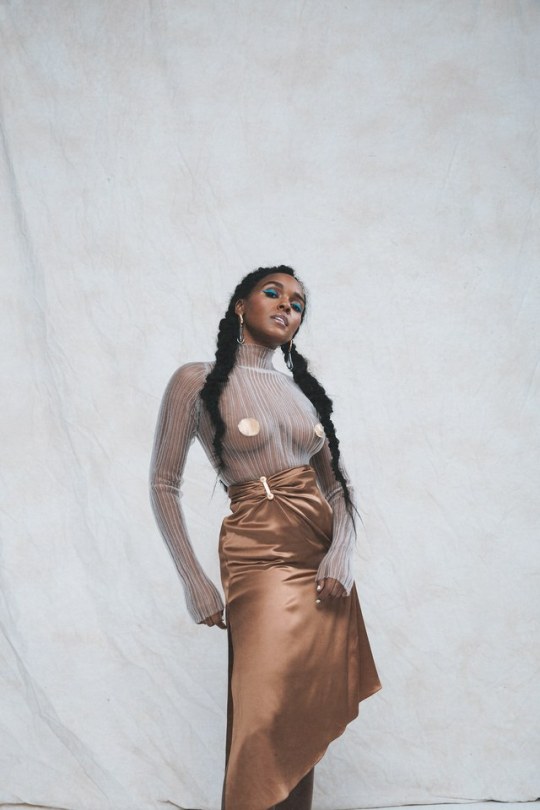
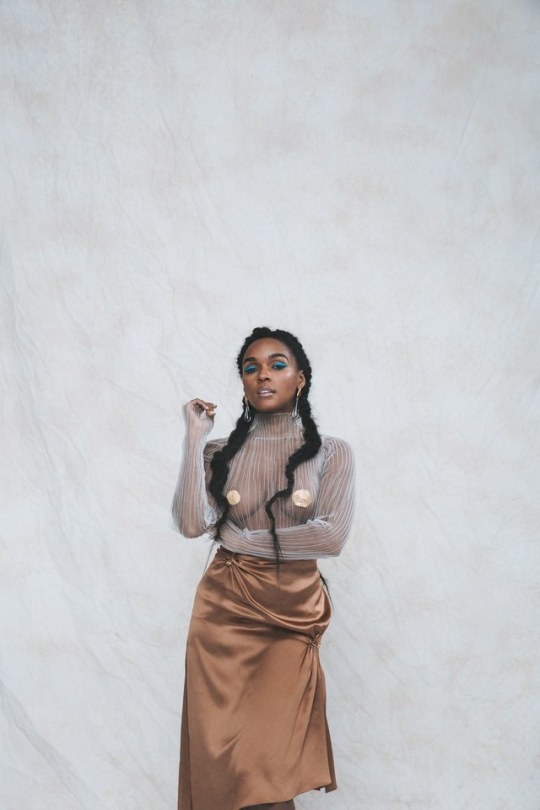
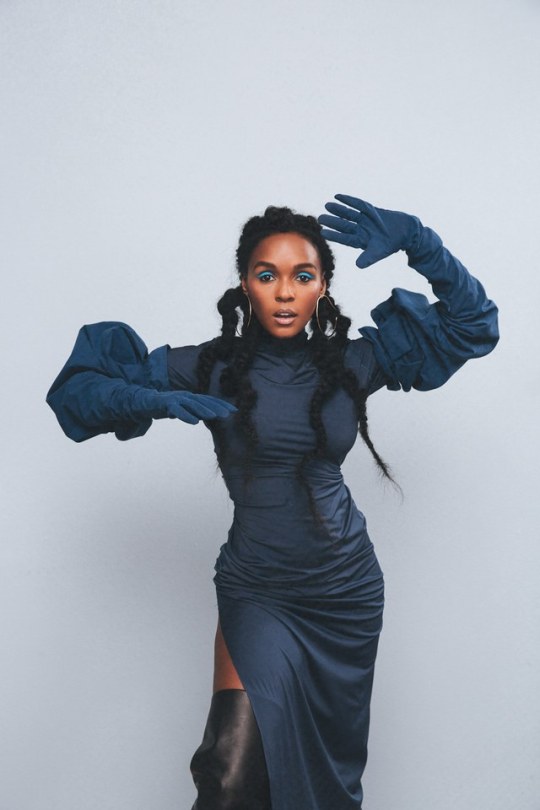
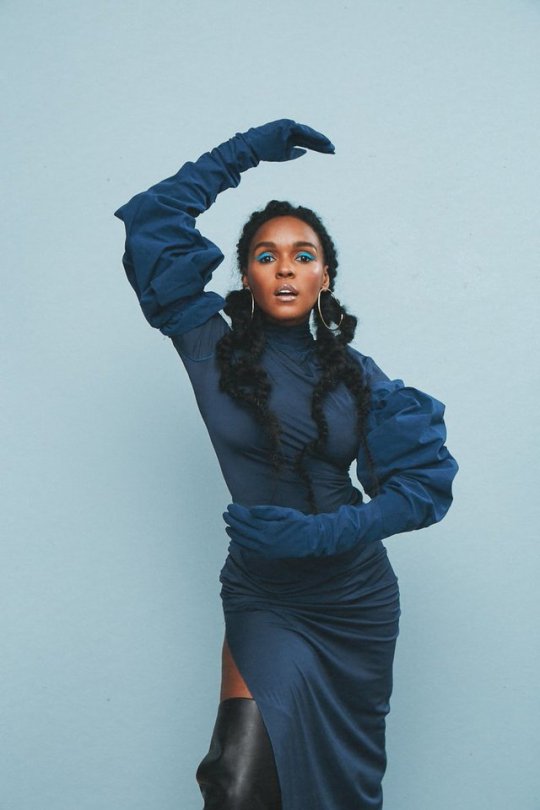
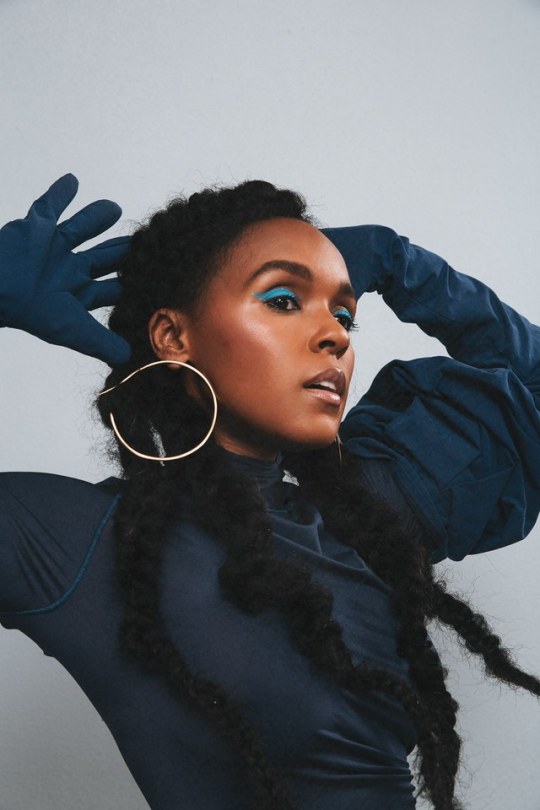
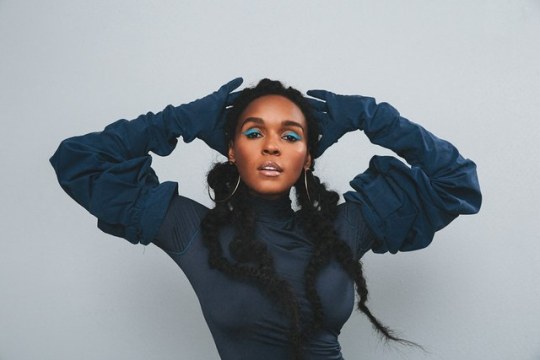
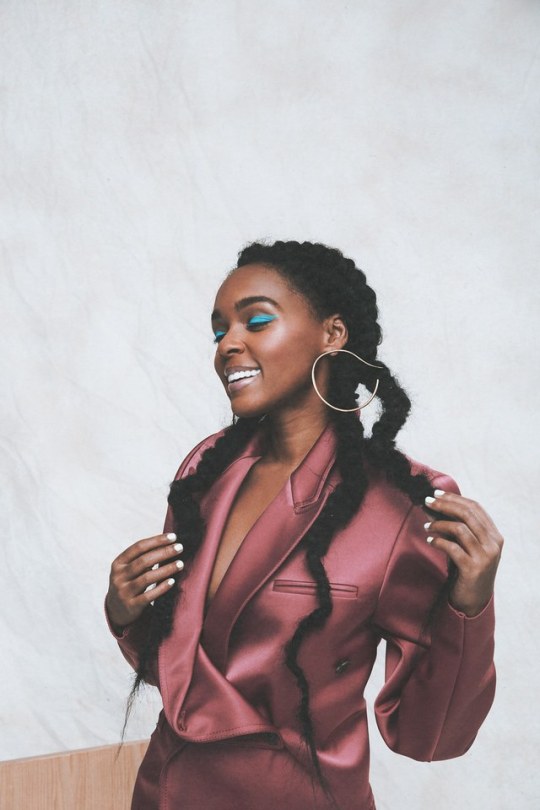
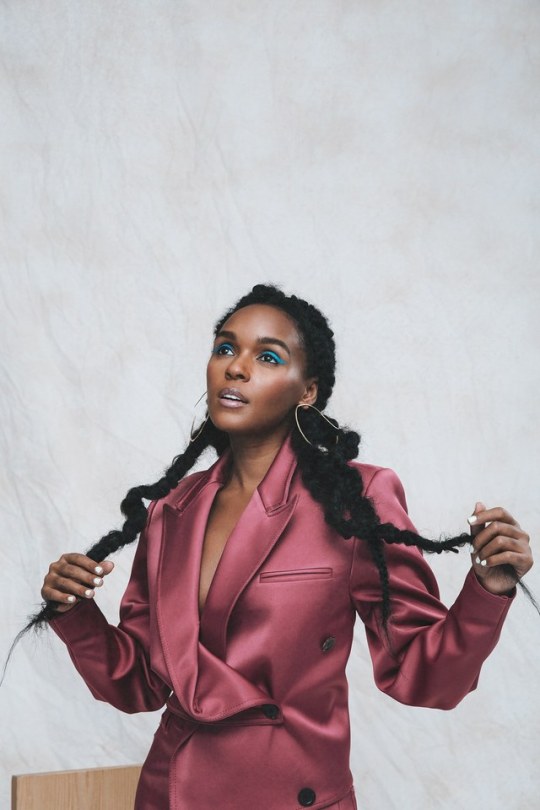
Janelle Monáe: Living Out Loud
For them.'s debut cover story, Lizzo and Janelle Monáe sit down to discuss coming out, freedom, and living and loving out loud.
April 12, 2019
When Janelle Monáe came out as queer in a Rolling Stone cover story last April, the revelation made headlines around the world. As one of the most prolific multi-hyphenate artists of a generation, her declaration carried immense weight, both for herself and for queer black women and LGBTQ+ people everywhere. The announcement was followed by the release of her most brilliant, vulnerable work to date: Dirty Computer, an album that was at its core about embracing the freedom one finds in self-exploration and discovery. Bold, unabashedly fluid anthems like “Pynk”, “Screwed,” and “Make Me Feel” further solidified Monáe as a leader for “free-ass motherfuckers” (as she delightfully referred to herself when coming out) everywhere, one who challenges social binaries and norms alike with grace and strength.
Always evolving sonically and aesthetically, today, Monáe is entering a new era of her genre-bending career. The constant, though, is her work, which remains centered in advocacy, agency, and empowerment, regardless of what form it takes. With reverence for the responsibility of an artist and activist, Monáe uses every platform she builds to amplify intersectional discourse about race, gender, and sexuality in new ways. She takes action in a way that makes everyone take notice.
Monáe’s ascent as an advocate for the LGBTQ+ community has tracked alongside her own journey towards personal enlightenment and fulfillment of purpose. It has come with an understanding of the paradox of visibility, and a reckoning with the fears and challenges that queer people, specifically queer people of color, face when living authentically. In taking center stage to speak out and perform against aggressive oppression, Monáe’s voice and vision for humanity help to define what it means to advance emancipation for all.
That’s just a sliver of why we chose Monáe to star in them.’s debut cover story, “Janelle Monáe: Living Out Loud.” It would only be right to have one free-ass motherfucker interview another for the occasion, which is why we recruited Lizzo, an inimitable musical force in her own right and an unerring LGBTQ+ ally, to speak with Monáe below. Both women are known for hits that make you dance while reaching for something deeper, and both share a commitment to uplifting marginalized communities, championing self-love and self-care, subverting social expectations, and speaking their truths through their work. In the wide-ranging conversation below, they touch on that common ground and more, speaking to the terrifying, liberating process of challenging the world’s preconceptions about you, what it really means to live freely in our world today, and loving and living out loud.
Lizzo: First of all, shout out to freedom, okay? Because when you first started talking about sexual fluidity in Rolling Stone, you made me feel like I could do whatever I wanna do and feel how I wanna feel. That’s freedom.
I think that there's so much freedom with sexuality in the world right now. And you are a huge part of that wave. Can you tell me about that journey?
Janelle Monáe: It's been a journey. For me, sexuality and sexual identity and fluidity is a journey. It's not a destination. I've discovered so much about myself over the years as I've evolved and grown and spent time with myself and loved ones. That's the exciting thing — always finding out new things about who you are. And that's what I love about life. It takes us on journeys that not even we ourselves sometimes are prepared for. You just adapt to where you are and how you've evolved as a free thinking person.
Absolutely. I was just talking about this the other day, about how fluidity can mean so many things. It's not just what you like in that moment. I've seen fluidity change with age. I've seen people come out in their sexual identity in their forties and fifties. Yet there's so much pressure on young people to choose an identity, when you're a teenager and your hormones are jumping off — it's like, "Choose an identity, choose a sexual orientation." It's like, "How?” When I like everything sometimes, and I like nothing sometimes.
Do you have any words for those who are struggling with their sexuality or coming out? At any age, but especially for young people.
Don't allow yourself to feel any pressure other than the pressure you put on you. And I think there's so much power in not labeling yourself. That said, there's also power in saying "This is how I identify,” and having community with the folks you identify with. Everyone is on a journey of self-discovery, and those of us who may not understand others’ journeys should be more empathetic and tolerant and supportive.
A big thing for me is just being patient with myself, and not allowing myself to make decisions based in fear, or a fear of people not understanding me. And it's hard. You go through experiences where you feel fearful, and you end up being depressed, or having anxiety, and not taking care of you. But that fear should not get in the way of how you love or who you love.
To be young, queer, and black in America means that you can be misunderstood. You can be hated. It also means that you can be celebrated and loved. And I think there's a lot at stake when you’re living out loud in that way.
Right. And when you’re in the public eye, there's another layer to that with your sexual identity — added pressure, or another kind of fear. Coming out is such a personal, liberating experience. It's nobody's business. But especially when someone famous comes out — and even if their friends or family already know who they're stickin' and lickin' — it’s like, when everyone knows and it's in your heart, is that even really coming out?
Do you feel like Dirty Computer was a public coming out? Or how did you see that statement you made?
Well, one, whenever I'm making music, I start with where I honestly am and what I honestly have to say. I work inward, and then I focus outward, on how it can impact people and be helpful to others. But it starts with me.
I knew the title of this album since before The ArchAndroid, so I’ve been sitting with it for some time. There were just conversations that I had to have with myself and my family about my sexuality and the impact that speaking honestly and truthfully about it through my art would have. I grew up in the Midwest; you did, too. You spent time in Minneapolis. I spent time in Kansas. I grew up there, in a very small town, and I went to a Baptist church; to be anything other than heterosexual is a sin in that community, and growing up, I was always told I'd go to hell if I was. There was a part of me that had to deal with what that meant.
After I had those conversations with myself and I saw a therapist, I had to be able to talk about what it meant to identify as bisexual. What does that mean? How would discovering that impact the relationship I was in at the time? How do I talk about it with my family? How do I go back to my church? The bottom line is I had to have conversations with myself and the folks that love and care about me, and realize they may not understand what it means for me to be a person who identifies as queer in this world. I’ll also add that it wasn't like I wanted to even make it a declaration. I knew that by being truthful through my art, people were gonna have questions, and I had to figure out a way to talk about it. And in having those talks with myself, I realized it was bigger than just me. There are millions of other folks who are looking for a community. And I just learned into that. I leaned into the idea that if my own church won't accept me, I'm gonna create my own church.
Hallelujah. How do you feel about the state of queer acceptance in 2019?
How do I feel about it? I mean, to be young, queer, and black in America means that you can be misunderstood. You can be hated. It also means that you can be celebrated and loved. And I think there's a lot at stake when you’re living out loud in that way. One thing I’ve realized even more was that when you walk in your truth, you can inspire and encourage people to walk in theirs’. I don't know if you got the opportunity to see, but I watched this episode of Queer Eye the other day, and there was this woman, Jess. A young girl from Kansas who really touched me. And I think she touched a lot of people. It was a special episode because I could relate to her — I knew what it meant to be that young and living in the Bible Belt. And she wanted so badly to be this strong, black, queer woman, and she said that I had influenced everything from the way she was dressed to the way she was seen. I just said to myself, "Man, the fact that my album has reached another young black woman like her, and it's helped her in her life, it makes me feel like I'm walking in my purpose and it's really what I'm supposed to be doing." And I can't give up.
I think people are looking for that validation. When they're trying to talk to their parents and their parents don't see that representation out in the real world and people being accepted like that — it's foreign to them, and I think that by being the example, we make it a little easier for kids to be able to talk to their loved ones about it.
Well, listen, sis. People were lit to know that you were queer as fuck. It was exciting. [laughs]
[laughs] I was terrified.
You were scared? What did you think was gonna happen?
I thought people were gonna say, "Oh, she's doing this as a publicity stunt." I thought I wasn't gonna be able to go back home and be at all the barbecues. I had anxiety. And a lot of it was just untrue. It was my fear of what people were gonna say. And I'm thankful that I didn't allow that fear to get in the way of my freedom.
The entertainment industry has not caught up. We're making some waves, but we can do better. And again, it’s about normalizing and telling more stories, and inviting more LGBTQIA+ folks into the conversation on the front end, and giving us a seat at the table early on. Because we can’t afford to see things in a binary way. That’s not how the world works.
That’s the fear of being part of any marginalized group. That fear — of being black and queer and a woman and young — that fear of erasure is really real. And being a public figure, coming forward with your identity and allowing people to be emboldened by that and inspired by that — back in the day, women like you were erased.
I talk about Sister Rosetta Tharpe all the time. She was black and queer and big, and invented rock and roll. And where is she? Where are her monuments? And by setting the example, you can help us change that, and counter that kind of erasure.
Are there any black queer women and artists that you wanna shout out? I feel like we need to get the flowers to these women.
Yeah! I love Lena Waithe. Having her representing on the film side and as a producer, a writer, and the fact that she's thriving and so successful, it’s encouraging. Lorraine Hansberry. Bell Hooks. Meshell Ndegeocello. Who else? I just hope we can get to a point where black women who don’t identify as strictly heterosexual are normalized.
Yes. And making it more intersectional as well, and including trans women in that narrative. I love Janet Mock. I am obsessed with her.
Yeah, me too! She is an incredible woman. And I love MJ Rodriguez. I love Indya Moore. I love Laverne Cox. Those women are amazing, and they are, every single day, normalizing what it means to be a trans woman, and speaking their truth and walking in it.
Amen. It’s all about representing. I just wanna pass out flowers and receive flowers, that’s all I wanna do. I think representation is so important. I wanna see drag queens at the Oscars. I wanna see a drag queen host the Oscars. Can that happen?
Listen, if it was on my watch, I would make sure it happens. I think the entertainment industry has not caught up. We're making some waves, but we can do better. And again, it’s about normalizing and telling more stories, and inviting more LGBTQIA+ folks into the conversation on the front end, and giving us a seat at the table early on. Because we can’t afford to see things in a binary way. That’s not how the world works.
No! It’s a spectrum, and everyone needs to realize and respect it. Respect the spectrum!
You also work with Time’s Up, and I think that’s really important. We gotta protect women’s rights. What work are you doing moving forward to help LGBTQ people gain a foothold in the film industry and media? And how has Time’s Up helped open up some doors?
I'm honored to be a part of Time’s Up and support women. And that's inclusive of all women. As a black woman, however, that's what I know and that's the lens that I'm looking at things through. Whether it be behind the scenes, producing and engineering, to writing or being in front of the camera, there's a lot more work that needs to be done.
I've also started my own organization, Fem the Future, which is a grassroots organization that provides opportunities across the entertainment and the arts, through mentorship and education, for those who identify as women. Through our work, we try to highlight and empower women behind the mic, behind the camera, the stage, the screen, the boardroom. Everywhere. And I founded Fem the Future because I was looking to collaborate with more women on the engineering side and production side and songwriting side, and it was so difficult to find women in these roles. It was frustrating. And I understood why. I said, "Oh, okay. We gotta make more noise." And so I decided to do something about it.
With Dirty Computer, I made a bigger declaration to myself — that I'm not putting out an album if I can't be all of me. You're gonna take the blackness, you're gonna take the fact that I love science fiction. You're gonna take the fact that I am a free ass motherfucker. You're gonna take that all in and because that is what you're gonna get.
That's amazing. I think women are phased out of creative industries by the quote-unquote “boy’s club” way early on. It’s more than just getting them the job — it's giving them the training, making them feel comfortable enough to make mistakes and lean into something and have a girl’s club. So they can get all the experience they need to be at the top of the game.
Let me tell you. It's not that we're not there, we're just not given the opportunity. We can compete at a high level. It's what you said, it's about us pulling for each other. And it's about men, also, who are in the experience of power actively seeking out more women. As artists, we get the opportunity to have this platform and shine light. And that’s the blessing.
Yes. I want to segue into you as an artist, and the music you’ve created and brought into the world. People who know you know that you're in control of the Janelle Monáe story, and your saga, and how the saga unfolds. Can you walk me through your character arc from The ArchAndroid all the way to Dirty Computer, and all of the things you've learned about yourself through your music?
That's a great question. I like to think that I know everything that a project is gonna do and be when I go into it — “I'm gonna go in and write this song, and it's gonna mean this.” But you know like I know, once you put something out and you sit with it, you find out new things that you weren’t even paying attention to. People will come up to you and say, "This is what this means to me." And you're like, "Wow, I had no clue that that's what I was saying, and that you would feel that way after you heard it." The beauty of art is that it reveals itself over time, even to the artists who create it.
I think I do have strong visions; I always have strong visions. With ArchAndroid, I knew what I wanted the content to be, and I used the tools that I knew how to use at that time to create it. In my projects, I always challenge myself to grow and learn my voice and how to stretch beyond what I can comfortably do. So I started to engineer myself more, which meant I got to spend more time with me. I produced as well. And I'm a writer, and a storyteller. So as I grow and as I'm taking in information and growing at this exponential rate, I try my best to create music and albums that support that, that allow me to completely be all of me.
With Dirty Computer, I made a bigger declaration to myself — that I'm not putting out an album if I can't be all of me. You're gonna take the blackness, you're gonna take the fact that I love science fiction. You're gonna take the fact that I am a free ass motherfucker. You're gonna take that all in and because that is what you're gonna get.
Yes. Take it or leave it. Making music — is that therapeutic for you, working through all of that?
Well, yeah. It is hard. It takes discipline to finish an album, to really sit down and say, "Okay, I need to show up." You gotta show up mentally. You can't just show up when every day is beautiful and you have the perfect candle and flowers there and it's smelling good. You gotta work through it. Even when I didn't feel like writing, I wrote, because it was important to challenge myself, to stretch my muscles and finish.
I didn't feel like I had all the time in the world to write Dirty Computer. When you think about the state of this country, when you think about who's in office, when you think about having a Vice President who believes in conversion therapy, and you think about how 77 percent of LGBTQ teenagers surveyed in 2018 report feeling depressed or down over the past week — I didn’t think that this album could wait.
I read from the Trevor Project that suicide is the second leading cause of death among young people aged 10 to 24. And that LGB youth contemplate suicide at at least three times the rate of a heterosexual youth. When you think about our trans brothers and sisters, our trans sisters being murdered, and when you just look at the state of the world, and when I'm working on an album like Dirty Computer that is centered around uplifting marginalized groups and those who feel isolated and outcast from our society, this album couldn’t wait. I had to get really focused.
And I also didn't wanna filter myself. I wanted to say it how I felt it. If I was upset, if I was feeling sexually liberated, if I was feeling afraid and vulnerable, whatever feelings I had, I laid it all out on the table. Once I finished, that was how I measured success. That's how I measured if I was gonna be proud of this work — did I show up? Did I show up?
Wow. When you talk about the world like that, and you lay all of those devastating facts ... It's not even facts. It’s what's happening to real people.
It can make self-care feel like a luxury, when people are being so aggressively oppressed — not just in their own neighborhoods, but throughout the country, by our administration. And because my messaging is self-care, because my messaging is self-love, it makes me want to reappropriate the term “self-care” into something that could save your life. It’s an idea that’s becoming trendy right now, but it’s much more than that. It’s like, “How do I take care of myself in this world that's not designed to take care of me?”
Artists like us, who do have a message in our music and connect with people on that level, have a responsibility to make self-care less about a fluffy day at the spa and help people in our community understand how important it is. How did you find self-care while you were dealing with talking about your sexuality to your friends and family in your community, and also while making Dirty Computer? And how can we repurpose that and help younger people learn that that term is more than just a trend?
I think one of the greatest gifts that I've been given as my therapy is music, is art. It's a gift that I honestly wish everybody could have and receive. And I think mental health is an issue in all communities, but particularly suicide rates, like I mentioned before, in the LGBTQIA+ and black communities. My community was not pushed to go spend their check on a therapist. It was, spend your check on some new Polo shirts and some Jordans. We weren��t taking our money growing up as teens and going to therapy. And I think a lot of us could benefit from that. But I do know that not a lot of people can afford it. And what I hope is that we can put more money into the mental health system around the world for young folks.
I love the Trevor Project. I love a place in New York called The Center. There are lots of places that offer help and therapy for those who have been pushed out of their homes. But I think what I've been able to do through albums like The ArchAndroid or The Electric Lady or Dirty Computer is to be able to talk about where I am at that time, and to release it and speak it out loud. And that has helped me immensely.
And also, I think it's important for us to be particular about the people we're hanging out with, too. I love the fact that I can be who I am at Wondaland with people who are inviting and patient with me as I walk through my process. And I think that it's our friends and our loved ones that we speak to and communicate with every day who can add to releasing pressure — the pressure and weight that we feel as we're trying to navigate life and walk through life, and embrace the things that make us unique.
You know what I noticed? The more I started loving myself, and the more I started self-caring, the people around me changed and became more conducive to that. The people who were toxic and weren't conducive to a self-loving nature just were segued out by God, by the universe, by my energy just repelling them. And I wish it didn't have to be that way, I wish it was the other way around. I wish that the people around us could help us find self-care and self-love. But that's unfortunately not the world that we were given.
We have to create our own worlds. And I think that mentorship is so important. Like you were saying, therapy's expensive. But mentorship can be free. And that's something that we can start with. Especially in lower income communities, the black community. But for now, we just have you.[laughs] We have music. People are looking to Dirty Computer and artists like you as mentors, long distance mentors. And I think it's really special that you hold that place in people's hearts and that it's reaching a culture. You can watch Queer Eye and see your influence. I'm just so happy to breathe the same air as you.
Oh, please. I’m happy to breathe the same air as you. You also are a free ass motherfucker to me in the way that you approach how you perform, how you love yourself publicly, how you embrace your body. And you're just gorgeous. On stage, offstage, the fact that you play an instrument, the fact that you're writing, the fact that you have ideas as a black woman — you are redefining what it means to be young, black, wild, and free in this country. And you are someone I actively look to whenever I feel like second guessing if I should take risks or not. Because I see the risks that you're taking and the love and appreciation that you show for yourself makes me lean further into loving and respecting myself, and being patient with myself, and not allowing myself to live by anybody's standards.
We are the standard. Thank you, sis. And you know what? Just keep rockin' in the free world, keep showin' 'em what it is. In every industry.
I will. You too. Let’s do it together. Collaboration. Come back over so we can keep on going. I cannot wait for your album. It's time. You've got to put a dent in the culture and in the planet. Rightfully so.
Let’s go. Let’s go!
Photographer: Justin French
https://www.them.us/story/janelle-monae-living-out-loud
428 notes
·
View notes
Text
30. Sonic the Hedgehog #22

Previous / Table of Contents / Next
The Return
Writer: Ken Penders
Pencils: Pat Spaziante
Colors: Barry Grossman
This issue doesn't pull its punches. Right away, we find ourselves in the alternate future depicted in the "Sonic in Your Face" special, where Sally and Sonic are married with two children who look like tiny clones of themselves. An ordinary, sunny day is suddenly ruined by the appearance of Robotnik's giant face leering down on the happy family. Well that's relaxing!

As soon as it appears, the apparition is gone, leaving a confused and worried Sonic to try to reassure his family that it was just a "freak of nature," as if nature regularly flashes the ghosts of your defeated enemies at you on picnic days. Robotnik, meanwhile - who, as you may have figured out by now, is the same Robotnik we saw vaporized in the previous issue - is teleported up to a strange space station, where a familiar face is awaiting him…

Hey, it's ol' Robo-Robotnik! Interestingly, this doesn't appear to be the exact same Robo-Robotnik from StH #19, but rather an alternate version of him in a slightly different reality, and indeed checking the wikia lists them as two separate entities. This version of Robo-Robotnik makes no mention of having turned his enemies into cyborgs, or indeed having invaded a different zone in the past. However, the rest of his backstory remains the same, with him having roboticized himself during the final battle with the Freedom Fighters in an attempt to keep himself alive. Apparently, after Robo-Robotnik's defeat, his remains became stranded on this space station while the Freedom Fighters went on to have a happy life and rebuild society, and the station's systems are slowly winding down, with Robo-Robotnik's consciousness doomed to die with them. He's actually given up - but the appearance of the real Robotnik serves to inspire him. And with that, Robo-Robotnik is able to use the station to send Robotnik back to his own zone.

Meanwhile, back in the zone we know and love, Sonic and the rest of the Freedom Fighters are in the middle of cleaning up the mess Robotnik left behind, believing him to be dead and gone. At the same time, Snively is stuck inside Robotropolis, throwing a temper tantrum and generally very depressed that his oppressive master is gone.
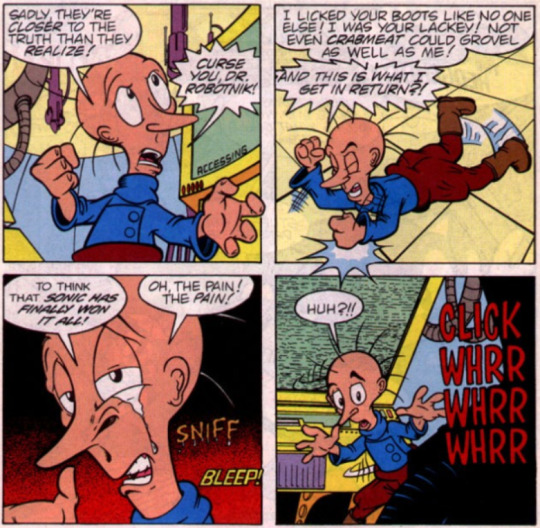
Mysteriously, his words seem to set off a chain reaction, in which Robotnik's face appears on every monitor available, announcing his intentions to take a scorched-earth approach from beyond the grave, to ensure that even in death his enemies can't win. Good times! Unfortunately, the robots mean it when they say they're targeting everything, and poor Snively looks like a lost cause until…
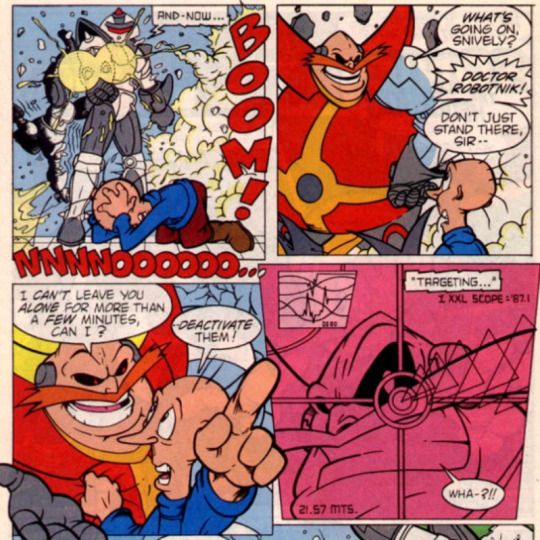
It's almost cute, their little banter back and forth. Robotnik informs Snively that he had actually spoken the code phrase to set off the robots - "Sonic has finally won it all." Snively is mostly happy to have his old master back… and yet immediately falls back into complaining about him. Poor Snively, indeed…
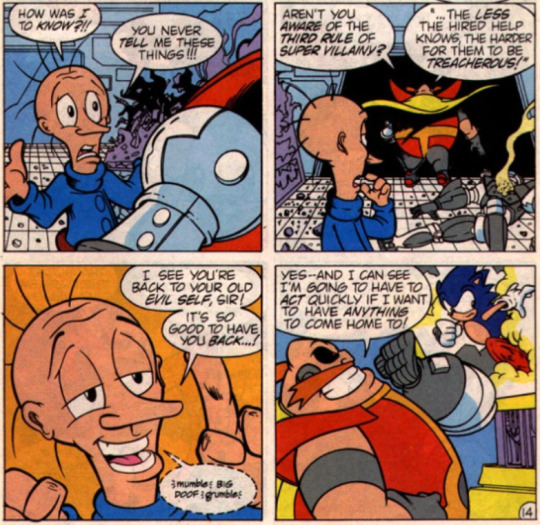
Robotnik, not wanting the planet to be destroyed now that he's back to conquer it in person, opts to halt his attack on the Freedom Fighters, who are currently fighting for their lives against an entire army of swatbots. On Snively's suggestion, he then proceeds to rub his victory in their faces, doing the "be grateful I'm allowing you to live" thing that egotistical villains just love doing.

That said… this is the first time we really get to see Robotnik's dark side. After all, during most of the comic so far he's been a rather wacky figure, who merely enjoys being evil for the sake of it, polluting rivers, turning people into silly little robots, and generally being more of a nuisance than a real threat. You can see the pretty intense shift here. He not only wants to win, he wants to make sure his opponents' wills are utterly crushed in doing so. And things only get more intense from here, now that Penders has more power as a writer…
Tails' Knighttime Story!
Writer: Angelo DeCesare
Pencils: Dave Manak
Colors: Barry Grossman
…but first, we have to have our designated "Tails is being a silly little kid" story!
This time, Tails refuses to settle down for bed, instead preferring to zoom around his room pretending to be Sonic. Sally, when Tails declares that he hates being left behind on important missions, decides to tell him a fable, inventing medieval characters based on the Freedom Fighters, including "Sir Runalot" the hero, "Mortail" his loyal page, and the evil "Sir Knightmare of Robotannia." One day, while Sir Runalot is out on vacation, Mortail decides to try on his full-body blue armor, and is thus mistaken for the real Sir Runalot by medieval versions of Sally and Uncle Chuck, who want him to defeat Sir Knightmare, who is invading on a stick horse. Of course, all of this goes as well as you'd expect.
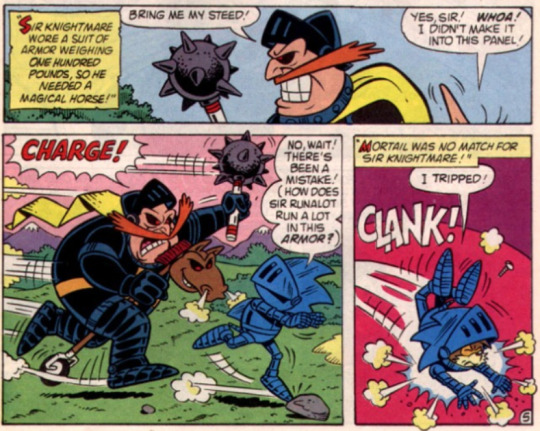
At the last second, Sir Runalot returns to save Mortail, who has learned a valuable lesson about how hard being a hero can be. And surely, thanks to this fable, the real Tails has as well! Right?
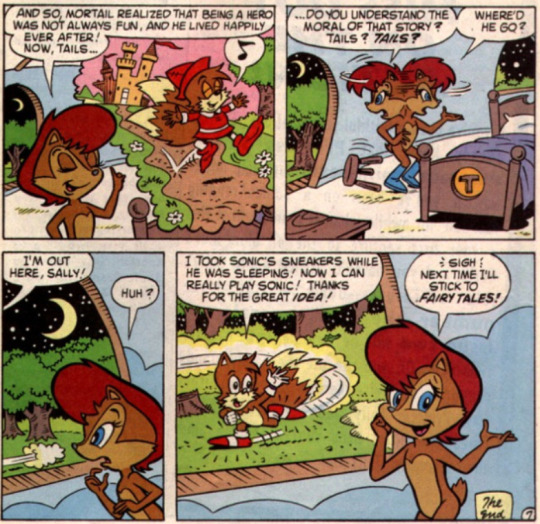
#nala reads archie sonic preboot#archie sonic#archie sonic preboot#sonic the hedgehog#sth 22#era 1 the early years#writer: ken penders#writer: angelo decesare#pencils: pat spaziante#pencils: dave manak#colors: barry grossman
2 notes
·
View notes
Audio
This song opens with a sample of a speech from John Trudell, a Native American activist. Sentiments of anti-racism and social justice for the Taiga people are in the novel, but not the main focus. More so than social justice, a central tension is the one between the Taiga and white cultures. This song highlights the real consequences of the ways Native cultures and lives are oppressed by society at large, and condemns the whitewashing of Native cultures.
[john trudell sample]
"We have never really seen the war go away
I mean
If you're dying
If you're dying from the 7th cavalry's bullets
If you're dying from induced poverty and racism and class systems and sex systems
And you're dying from alcoholism and poverty
Or someone has come in now in the name of maximizing the profit
And they're getting you to work in the mines, the uranium mines
And you're dying from lung cancer and you're dying from the cancers and the diseases that come out of that
You're dying
It's the same as the bullet killing you
And I see it all as a war"
On dusted plains
Songs that my people sing
Make me feel like I ain't gotta worry bout a thing
The ballad swings
Everyone treated like a king
Remember mother earth
And the teachings that she brings
But why I'm back
You'll find that
It's all related
It reminds that with purpose we're all created
But that's debated
Distorted by those who hated
On our beliefs
Cause we believed all things were sacred
The long-awaited
Seventh generation feels
The pain
Uranium drain from our black hills
Let it rain
Genocide won't pay the bills
I feel the shame
Suicidal thoughts give me chills
I can't escape that warming up with this smallpox blanket
While I see my mother get abused
I'm accused
Of a rebel
Cause I don't dance with the devil
I got these
Reservation blues
I bet their hearts drop when they hear these drums
And hear our songs now
Tired of being oppressed
We're standing strong now
You can't white wash me in this white war
You can't speak about people you don't fight for
Their hearts drop when they hear these drums
And hear our songs now
Tired of being oppressed
We're standing strong now
You can't white wash me in this white war
You can't speak about people you don't fight for
I'm a product
Of chaotic love
Planted in psychotic mud
A rose from rosebud
Who rose from haunted clubs
Hooked on phonics
Beating on my sonic drum
Addicted to my demons
And my melancholic drug
Self-hate on my sleeve
Self-destruction on my mind
Alone in this house I built with my beats constructed rhymes
I'm not allowed to leave
Until I deconstruct my mind
Historical trauma
Got my spirit stuck in time
Manifest destiny
Arrested all that is left for me
I used to be free in this land
But now I'm a refugee
In the name of progress
Presidents ordered the death of me
Shout out Lakota 38
I pray that you're blessing me
Resistance is natural
Ancestral energy
God has the survival
Decolonized memories
Apologies will never make amends for your colonies
America, you a bitch
Give us our sovereignty
I bet their hearts drop when they hear these drums
And hear our songs now
Tired of being oppressed
We're standing strong now
You can't white wash me in this white war
You can't speak about people you don't fight for
Their hearts drop when they hear these drums
And hear our songs now
Tired of being oppressed
We're standing strong now
You can't white wash me in this white war
You can't speak about people you don't fight for
They say these wars never ended
Descended from the spirit
Singing songs of freedom
Our ghosts make you hear it
Genocide never ended
Descended from the spirit
Singing songs of truth
Their lives make you fear it
Way of life never ended
Descended from the spirit
Singing songs of freedom
Our ghosts make you hear it
Revolution never ended
Descended from the spirit
Singing songs of hope
Hoping my people hear it
[john trudell sample]
"and in order for that system to work
They have to mine our minds
To get at the essence of our spirit
The mining of the essence
The mining of the spirit
Mining our minds
The pollution from that
Is all of the neurotic, distorted, insecure behavior patterns that we develop
That's the pollution
But it's a disease
Lives and travels through the mind
Through the generations"
0 notes
Text
How Beyonce's 'Lemonade' Exposes Inner Lives of Black Women
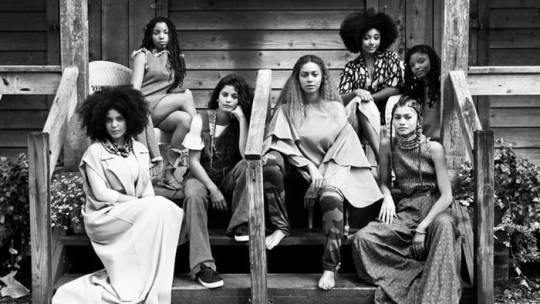
By Zandria F. Robinson
Lemonade continues Beyoncé Knowles' longstanding engagement with black Southern regionalism. The video album writes black women back into national, regional and diasporic histories by making them the progenitors and rightful inheritors of the Southern gothic tradition. Beyond "strong" and "magic," Lemonade asserts that black women are alchemists and metaphysicians who are at once of the past, present and future, changing and healing the physical, chemical and spiritual world around them. Rihanna uses her "glitter to make [your shit] gold," Erykah Badu compels men to "change jobs and change gods" and Janelle Monáe's Cindi Mayweather is secretly leading the Android Revolution. But Beyoncé accounts for the method behind black women's alchemy. Traversing genre and space, she fundamentally transforms the Southern platitude about what one should do when life hands her lemons.
Part of black women's magic, born of necessity, has been the ability to dissemble: to perform an outward forthrightness while protecting our inner, private lives and obscuring our full selves. We have drawn on this culture of dissemblance, as Northwestern University historian Darlene Clark Hine has called it, to deflect physical and discursive violence, cultivating rich inner lives that play out behind the enduring walls of Jim Crow. Beyoncé rejects any magic predicated on constraint with Lemonade, a meditation on the process of becoming a black woman in a society in which black women matter the least, are "the mule of the world" and are the most disrespected, neglected, and unprotected. Through the metaphor of lemonade — the South's other cold drink, sweet tea's antithesis and sometimes nemesis, but perhaps its best collaborator — Beyoncé insists on alternative forms of inner magic that demand emotional disclosure for healing, wholeness and a freer kind of freedom.
Lemonade is an extended introduction to "Formation," the song, visual and live performance that transformed our collective 2016 Super Bowl weekends. As the culmination of a different kind of Great Migration story, "Formation" foreshadowed the movements between space (rural and urban) and time that Lemonade takes up. But "Formation" tells us little of the physical, emotional and social labor — the trans-formation, as it were — it took to get in-formation. We learn from Lemonade that "Formation," the last track on the audio album, is the result of a dissembling and silenced black womanhood, broken, baptized, forged in fire and resurrected through the strength of intergenerational mother wit to sing and signify resilience and resistance.
Black women's expression of emotion can be discursively and physically dangerous for us, and sometimes telling our truth leads to violence or death. But on screen and in our minds, Lemonade provides a risk-free emotional space that sonically and visually highlights what we all miss when we dismiss and neglect black women's emotional lives. In a musical landscape replete with black men's emoting — Kanye West's misogynist breakup screed, Drake's perpetual hurt from the good girls who get dressed and go out too much, Kendrick Lamar's struggles against a depression-inducing capitalism — Lemonade takes up a bittersweet space to explore how it feels, and how it has felt for so long, for black women to be so black and blue.
Lemonade is a womanist sonic meditation that spans from the spiritual to the trap, with stops at country soul and rock & roll in between. Its visual landscape is packed tightly with a consistent iconography of black Southern women's history and movement through the rural and urban Souths of the past and present. The film signifies on Eve's Bayou and Julie Dash's Daughters of the Dust, centers sacred Nigerian body art practices, draws on the words of Warsan Shire and grandmothers' reflections and returns again and again to Louisiana plantation spaces where black women become both the hoodoo man and the conjure woman, setting things ablaze from their very depths and surviving and healing. This rich, multilayered backdrop is not the canvas for the revelation of trite tabloid tidbits.
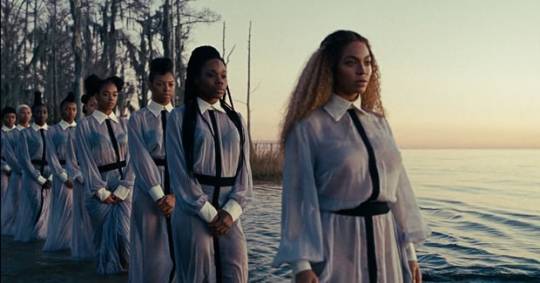
Although there are some underlying tensions between verisimilitude and reality in Lemonade, Beyoncé invites us to the work as a memoir, a meditation and a celebration. Like much work that has emerged in the age of Black Lives Matter, we are to read the literal relationship turmoil as a metaphor for black women's relationship to modern systems of oppression. By offering up a prayer first, Lemonade spurns from the outset the unrelenting hate-consumption of black women's hurt and anger that other media, notably reality television, encourage. Instead, with Beyoncé's account of her black girl alchemist journey as only a starting point, Lemonade concerns itself with legitimating and creating space for a range of black women's emotions, pushing back against the generational curse of hurt patriarchs and unrelenting state actors who refuse to stop hurting the women and girls who sacrifice the most and love them best.
In still and quiet formation, black women, donning white, watch us from plantation porches, returning the gaze to remind us that they are people who are feeling. Serena looks at us. Leah Chase's eyes smile at us. Quvenzhané watches us. Beyoncé meets and holds our eyes. Lesley McSpadden, Sybrina Fulton and Gwen Carr, mothers of the slain Mike Brown, Trayvon Martin and Eric Garner, look at us, asking us to look at them and the pictures they hold of their murdered sons. Southern black women, their hair freshly Marcel-curled, look and smile. We are to be seen, they say, not just watched and consumed.
The film's thesis is made evident in the transition from "Pray You Catch Me" to "Hold Up." Diving from atop a building into herself, the transition finds Beyoncé's true self under water, slumbering, while she outwardly tries to dissemble, to bracket the hurt and anxiety of a potentially cheating partner. What follows is an emergence from baptismal waters. Donning the saffron garb associated with Yoruba Orisha Oshun, whose presence endures in black Southern religious practice, Beyoncé emerges from the water un-dissembled. As such, she is both joy and rage, bringing forth more water in which the street's children can play, busting out windows with her bat Hot Sauce, and relishing a theretofore unrealized freedom to be emotionally human.
Lemonade's multiple chapters — intuition, denial, anger, apathy, emptiness, accountability, reformation, forgiveness, resurrection, hope, redemption — are at once about one couple; many couples; the sometimes complicated relationships between black women, men, fathers and daughters; and black women's relationship to an unequal America. In their number, the chapters deliberately obscure alternative organizations of the work, like those deployed by Erykah Badu's "Denial," "Acceptance" and "Relapse" on "Green Eyes" or Coltrane's "Acknowledgement," "Resolution," "Pursuance," and "Psalm" on A Love Supreme. This refusal to group emotions into larger categories compels us to experience a broader spectrum of black women's emotional lives.
Lemonade is Beyoncé's intimate look into the multigenerational making and magic of black womanhood. In its moves through genre, space, place and time, it offers new tools to see black women, to listen to us, and to say our names. To black women, it offers up a saffron-tinged blueprint for love and salvation through love — of ourselves, of our significant others, of our children, of our spiritual lives — when we are so often treated as fundamentally unloveable. And though it is for certain a work of black girl alchemy, it contains infinite lessons for our fraught political moment, teaching us to register a range of emotion so we might begin our own collective journeys of transformation.
Beyoncé's tour kickoff show in Miami featured powerful 'Lemonade' tracks and hits from her Destiny's Child days.
0 notes